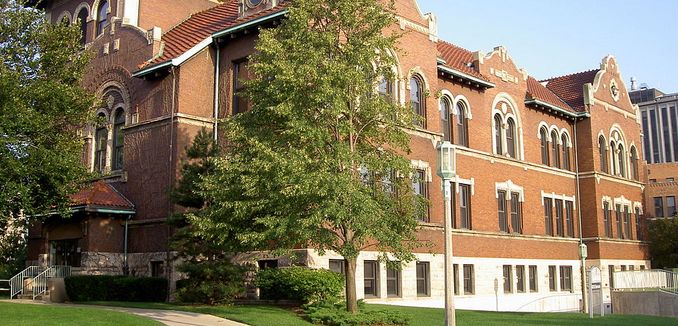After committing several violations earlier this month while blocking a display set up by the Jewish student organization Hillel, Students for Justice in Palestine was suspended last week from all on-campus activities at Loyola University Chicago.
The Brandeis Center praised the university’s action:
This afternoon, the Louis D. Brandeis Center for Human Rights Under Law (LDB) commended Loyola University Chicago for presenting the Students for Justice in Palestine (SJP) student organization with a letter indicating that SJP is temporarily prevented from hosting any on-campus activities or events until their leadership meets with Loyola University Chicago representatives and the group complies with stated policies and procedures that apply to all student organizations. …
LDB President Kenneth L. Marcus commented, “By all reports, this appears to have been a serious incident, and we are glad that Loyola University Chicago is taking it seriously. More work must still be done, and we hope that Loyola University Chicago will follow-up and take appropriate further action. Sadly, we have seen a pattern of incidents in which SJP has violated the rights of other students and the rules of other universities. We are glad that Loyola University Chicago is upholding its standards and values.”
At the time of the altercation, a student reporter for The College Fix quoted Hillel chapter president, Talia Sobol, about what happened:
Sobol said the university is investigating the incident. She said the protesting students violated at least six community standards: “not receiving prior permission for a protest,” interfering with the rights of others to demonstrate, blocking entrances or exits on campus, harassing other registered student organizations, threatening university members and disrupting a building’s normal functions, in this case the Damen Student Center.
“Hillel students are anxious for results [from the university investigation], and want to feel protected on this campus,” Sobol said, adding that “campus security must attend every single event we hold because of the campus climate towards Jews.”
Molly Rosen recounted similar feelings of intimidation by anti-Israel activists in Staring Down the Devil at the University of Michigan, which was published in the April 2014 issue of The Tower Magazine.
During the weekly assembly meetings, there is a section for Community Concerns, during which people have three minutes to address the assembly on any topic. I expected that this time slot would consist of students discussing new curriculum requirements or better dining facilities. Instead, it often consisted of anti-Israel and anti-Semitic hate speech. Every week certain individuals would urge students to take action against “the racist, Nazi state of Israel”; and every week I would sit there feeling utterly helpless.
In Why Are Student Leaders and Jewish Bruins Under Attack at UCLA?, published in the June 2014 issue of The Tower Magazine, Tessa Nath similarly recounts:
By the time the council actually voted on the issue, the meeting had extended into the wee hours of the morning on February 26. It lasted for nearly 12 hours, with nine hours of public comments, despite each speaker being limited to only two minutes per statement. As a student in the audience, I watched with a sense of helplessness as blocks of students went up to the microphone to gush hate, bias, and one-sided claims from all sides of the divestment advocacy spectrum.
[Photo: Amerique / WikiCommons ]




